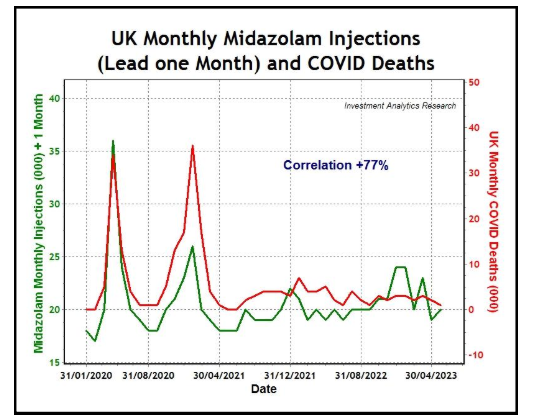An extremely well-cited Australian paper, published by the open-access journal Medical and Clinical Research claims that the pandemic in the UK from 2020-2022 was caused not by the SARS-CoV-2 virus, but by euthanasia of elderly patients in hospitals and care homes using the sedative Midazolam, ostensibly to clear beds in a clogged NHS in anticipation of a COVID-19 epidemic that never materialised.
Rights 'were violated'
The paper demonstrates high correlation between the administration of Midazolam, a sedative that is indicated for end-of-life treatment, and the spike in excess deaths in April 2020. The paper notes that various bodies, including Amnesty International, the Care Quality Commission, and the UK parliament, have lamented the blanket application of ‘Do not attempt cardiopulmonary resuscitation’ (DNACPR) and ‘Do not attempt resuscitation’ (DNAR) orders by hospitals and care homes in the early months of the reported pandemic. Amnesty is quoted as saying that patients’ human rights ‘notably their right to life, their right to health, and their right to non-discrimination’ were violated.
Widespread policy of non-voluntary euthanasia
Euthanasia remains illegal in the UK, but guidelines published by the National Institute for Clinical Excellence (NICE), ‘following WHO (World Health Organisation) COVID-19 guidance’ at the start of the alleged pandemic appear to have opened the doors to a widespread policy of non-voluntary euthanasia of elderly and vulnerable patients, without consultation of themselves or their families, and with an apparent bias towards the non-vaccinated.
The paper reports that the COVID-19 injection itself has been found to be the cause of Australian deaths. However, in the UK, the influence of Midazolam makes it impossible to demonstrate the mortality or non-mortality of the RNA vaccine. However, the virus itself appears to have been ‘largely absent’ in the UK for the period in question. The PCR test, which ‘does not detect presence of the SARS-CoV-2 virus’, and therefore gives meaningless results has been responsible for flawed data.

The ’anomaly’ of April 2020
The highest number of deaths in the UK during the period defined by the reported event of a COVID-19 pandemic occurred during April 2020. At this time excess deaths reached 100% of baseline, with 43,796 excess deaths, the most affected region being London. This sudden spike in deaths was used as a justification for the declaration of emergency and the imposition of authoritarian policies such as masking and lockdown. However, at the same time the UK Health Service Agency declared that COVID-19 was ‘no longer considered to be an HCID [high consequence infectious disease] in the UK.’ However, the use of Midazolam was simultaneously spiking, with a correlation of 91% between the increase in Midazolam prescription and the increase of reported deaths, allowing for a lag of one month, as medication will not always kill immediately, neither are deaths always immediately reported.
The lethality of Midazolam
Midazolam, used orally, is not usually lethal to healthy people, however intravenously administered high-dose Midazolam given to elderly people with comorbidities, including the terminally ill, can be fatal. According to the US National Library of Medicine, ‘Midazolam injection may cause serious or life-threatening breathing problems such as shallow, slowed, or temporarily stopped breathing that may lead to permanent brain injury or death.’ As the paper notes, Midazolam is also used in US executions.
Conclusions
The paper has a number of conclusions, including that the pandemic in the UK was ‘iatrogenic’, i.e. that it was medicine-induced, that the April 2020 spike was not caused by the SARS-CoV-2 virus, and that Midazolam injections were highly correlated with UK excess deaths throughout the pandemic. Vaccines were unlikely to have been beneficial, if not actually harmful.
The situation in the UK throws doubt on worldwide investigations of COVID-19 epidemiology, ‘because their assumptions are generally false due to the significant presence of confounding factors in some countries, such as the UK.’
A symptom, illness, injury or side-effect due to medical treatment
Full medical glossary


